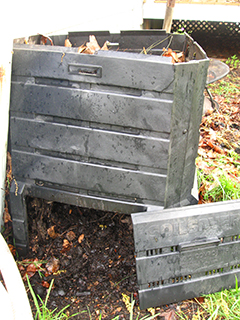
Using compost as a soil amendment is beneficial primarily because it increases organic matter. Although organic matter makes up a very small proportion of the soil, it is vital for plant growth. Organic matter in the soil is important for:
- improving soil structure
- soaking up water
- providing energy for microorganism activity
- buffering pH
- providing nutrients
Ideally, topsoil should have 3–5% organic matter content, depending on the soil type, and should be at least 6 inches deep. Organic matter can be increased by tilling in compost at establishment. Compost has a high organic matter content so it needs to be well tilled into the soil down to 6 inches. Alternatively, on established lawns a ¼" compost layer can be spread in the early fall and spring.
Utilizing compost and compost tea helps to increase the activity of soil organisms, such as insects, earthworms, fungi, and bacteria. It is the activity of these organisms, termed biological activity, which releases plant available nutrients from compost and natural organic fertilizer. A key aspect of organic land care is maintaining or restoring the soil's biology, which could take many years on heavily degraded soils.
Compost Tea
Compost tea is a liquid extract of compost, rich in beneficial microorganisms and small amounts of soluble nutrients. Applying compost tea to a lawn or garden helps spread beneficial microbes onto soil and plants. Nutrients from the compost is quickly made available for plant uptake. Compost tea can be brewed in small batches using a bucket, an aerator, and a mesh bag filled with compost and steeped for 24–36 hours. Alternatively, large-scale brewers are on the market which can be used to brew large batches.
Collected rainwater, such as in a rain barrel, or well water can be used for brewing compost tea. It is important not to use chlorinated water when brewing or applying compost tea because chlorine will kill the beneficial microbes. Therefore, tap water from the public water supply should only be used after left standing for 24–36 hours so the chlorine can dissipate. The water should be covered with a screen to prevent mosquitoes from breeding.

